German forces reached Smolensk this week, advancing from north and south with a view to trapping the 600,000 Soviet soldiers there; but although half of them were captured, 100,000 escaped the trap. Even so, the road to Moscow now lay open; the Russian capital was just 200 miles away. In the north, Soviet forces launched a counter-attack against the Germans advancing on Leningrad; although it failed to stop the advance, it did cause heavy German casualties.
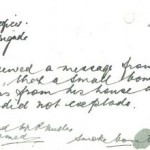 Now that the Luftwaffe was focused on the invasion of the Soviet Union, British planes seem to have taken up the challenge of bombing Caithness instead. The following report dated 20 July is from the Wick Police incident file: “We have received a message from H.G. Alexander, Alterwall, Lyth, that a small bomb was dropped about 20 chains from his house at Burnside, Alterwall. It did not explode.” A note underneath the message reads, “Smoke bomb from own aircraft”.
Now that the Luftwaffe was focused on the invasion of the Soviet Union, British planes seem to have taken up the challenge of bombing Caithness instead. The following report dated 20 July is from the Wick Police incident file: “We have received a message from H.G. Alexander, Alterwall, Lyth, that a small bomb was dropped about 20 chains from his house at Burnside, Alterwall. It did not explode.” A note underneath the message reads, “Smoke bomb from own aircraft”.
Schools across the county had broken up for the summer holidays, but the Caithness Education Committee 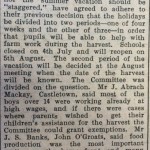 decided this week once again to stagger the summer vacation. As the John O’Groat Journal reported, “the holidays would now be divided into two periods – one of four weeks and the other of three – in order that pupils will be able to help with the harvest.” But because the harvest depended on the weather, “the second period of the vacation will be decided at the August meeting when the date of the harvest will be known.”
decided this week once again to stagger the summer vacation. As the John O’Groat Journal reported, “the holidays would now be divided into two periods – one of four weeks and the other of three – in order that pupils will be able to help with the harvest.” But because the harvest depended on the weather, “the second period of the vacation will be decided at the August meeting when the date of the harvest will be known.”
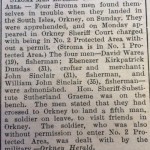 The John O’Groat Journal also reported the arrest of four men from Stroma this week. The men, three fishermen and a crofter, had crossed over to Orkney with a soldier home on leave, taking him to visit friends. But Orkney was in No.2 Protected Area, whereas Stroma, like the rest of Caithness, came under No.1 Protected Area; and the men didn’t have the correct paperwork. The Stroma men were “admonished” by the Hon. Sheriff-Substitute, but weren’t otherwise punished; but the soldier, the report concludes ominously, “was dealt with by the military”.
The John O’Groat Journal also reported the arrest of four men from Stroma this week. The men, three fishermen and a crofter, had crossed over to Orkney with a soldier home on leave, taking him to visit friends. But Orkney was in No.2 Protected Area, whereas Stroma, like the rest of Caithness, came under No.1 Protected Area; and the men didn’t have the correct paperwork. The Stroma men were “admonished” by the Hon. Sheriff-Substitute, but weren’t otherwise punished; but the soldier, the report concludes ominously, “was dealt with by the military”.
The Director of Education had been filling in a return to head office about the midday meals the county’s children 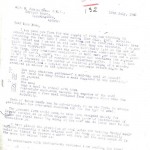 took at school: “As you may know, children sometimes bring food with them, they sometimes contribute so much per week and a joint supply of cocoa, sugar, etc. is purchased, and sometimes the expense is met by the result of concerts or voluntary gifts.” He added drolly: “I have placed the provision of soup under the heading “Solid Meal” because frequently I have noticed that the soup is so essentially solid as almost to require a knife and fork and the more solid it is the more the bairns like it”.
took at school: “As you may know, children sometimes bring food with them, they sometimes contribute so much per week and a joint supply of cocoa, sugar, etc. is purchased, and sometimes the expense is met by the result of concerts or voluntary gifts.” He added drolly: “I have placed the provision of soup under the heading “Solid Meal” because frequently I have noticed that the soup is so essentially solid as almost to require a knife and fork and the more solid it is the more the bairns like it”.
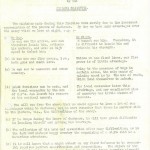 Finally this week, the Home Guard took part in a training exercise, codenamed Operation Scrabster. The commanding officer wrote a report setting out what they could learn from it, mainly that night-time operations cancelled out many of the advantages of local knowledge; or, as he happily put it, “The mistakes made during this Exercise were mostly due to the incorrect appreciation of the powers of darkness…”
Finally this week, the Home Guard took part in a training exercise, codenamed Operation Scrabster. The commanding officer wrote a report setting out what they could learn from it, mainly that night-time operations cancelled out many of the advantages of local knowledge; or, as he happily put it, “The mistakes made during this Exercise were mostly due to the incorrect appreciation of the powers of darkness…”
